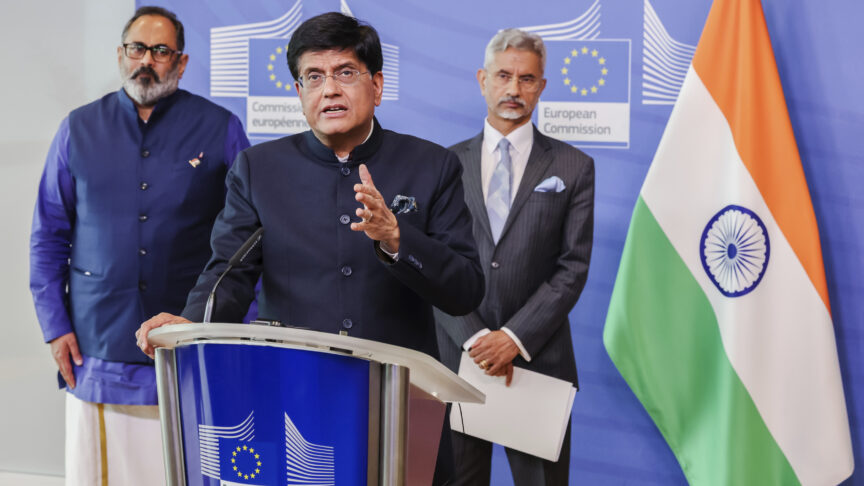Europe meets China: time for the mouse to roar
On Wednesday Brussels hosts an EU-China Summit. Will Europe be able to take advantage of the opportunity? Or will it lack a real sense of urgency, like the Chinese Qing court in the middle of the 19th century, and see the rest of the world move on without it?
There was something familiar about the recent internal EU row over the Roma. The September 16 European Council meeting was meant to focus on how Europe should deal with a rapidly changing world and its emerging heavyweights. Few issues are as important, particularly with preparations underway for an EU-China summit, a smaller-scale summit with South Korea, and an Asia-Europe meeting on October 6.
Instead, serious thought about emerging powers was hijacked by the media subject of the day – the French government’s decision to expel Roma migrants. Voices were raised, divisions were highlighted, and column inches were generated. And what of the long term strategising about emerging powers? As ever, not very much.
In theory, European Council meetings are an opportunity for heads of government and the president of the European Commission to sit down and work out the EU’s approach to big issues. The raucous debate over the Roma shows that the meeting has yet to mature into the body that some hope it might become.
An educated guess is that the agenda item on emerging partners – including China and India – was largely thrown overboard at the meeting. To his credit, President Herman Van Rompuy made public remarks which amplified some of the formal conclusions of the summit. These signal a welcome change of semantics in EU policy towards its strategic partners, including China. The usual fluff about teaching others how to develop and become more like us has been replaced by a tone with a sharper edge. The European Council noted that relations with strategic partners “will only work if they are two-way streets based on mutual interests and benefits”. Van Rompuy added that “reciprocity is not a dirty word”, and emphasised the need for “leverage”. Catherine Ashton, the EU’s high representative for foreign and security policy, has been tasked with laying the groundwork for European “interests and leverage” on strategic partners.
This change in semantics could and should apply to the preparations for the EU-China summit, with fine words accompanied by European resolve. Alas, resolve is often far less apparent in Brussels than internal politicking, and the rumours are that Van Rompuy, Ashton and Commission President José Manuel Barroso, are instead spending much of their energy fighting turf wars – one of them over the coming European External Action Service. With a staff of eight thousand, and the first tranche of appointees recently disclosed, Europe’s diplomatic service is starting to take shape. However, the shape will only be confirmed when it has one boss, and a clear set of instructions.
This translates into a lack of direction over the other issues facing Europe. Just a fortnight before the back-to-back Asian meetings, the Council only came up with vague guidance on wide-ranging topics – the usual suspects, from emission reductions and cybersecurity to good governance and labour standards.
What European leaders will be saying at the Asia-Europe Meeting is of no great import. That is certainly not the case for meetings with China and South Korea, two powerful and realist partners.
China in particular is in a strange mood. On the one hand, it seems to be picking geostrategic fights with a range of Asia-Pacific neighbours, including the United States. At the same time, it has demonstrated its consideration for the European Union and its leadership. Is this because the mouse roars fiercely, or because it is cost-free to be polite to a mouse? If Europe continues its soft power exercises and one-way gifts, we will probably never find out.
But if Europe is to change, and talk about mutual interest, reciprocity and leverage, we are back to the question of resolve. That is not easy: China’s leaders have acquired a sixth sense for detecting bluff in their partners, and are adept at making them eat their words.
Let us not delude ourselves that Europe is going to find the solution to this problem before this week’s summit. The best we can hope for, in the short term, is a statement which would reflect some of its goals and interests: “reciprocity”, for instance, has been mentioned only once so far by an EU-China joint summit statement (and that was in May 2009).
What we should hope for is that Europe overcomes its Brussels turf wars, reserves its controversies of the day for the European Parliament, and manages to build up the necessary internal coordination among its services and with the member states. This requires strong top-down political leadership, and that is just what the Lisbon Treaty promised in the area of common foreign policy and security. Please, it is now time to deliver on this promise. It is time for the mouse to roar and mean it.
If it fails to do this, the Union may end up looking like China’s late Qing court in the middle of the 19th century. The court had plenty of advisers and debates, yet without any sense of urgency. The result was a world that moved on without it. Infatuated by its own book of rites, the European Union could also be fooling itself that the world will wait.
This article first appeared as a web-special for E!Sharp
Click to read about the latest edition of China Analysis – ‘Geopolitics on Chinese Terms’.
The European Council on Foreign Relations does not take collective positions. ECFR publications only represent the views of their individual authors.


